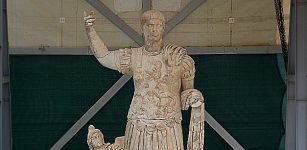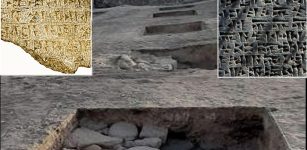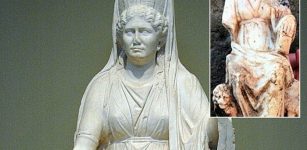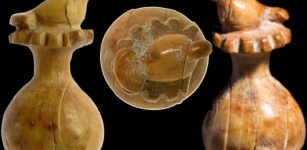Hades – Land Of The Dead In Greek Beliefs Offered Punishment And Paradise Full Of Harmony
A. Sutherland - AncientPages.com - In Greek mythology, there is a well-known myth of Hades, a harsh, shadowy place where the dead lived. Hades is also the name of the god who reigned over this inhospitable realm.
Hades does not resemble the Christian hell and cannot be compared to Irkalla, the ancient Mesopotamian underworld, or Mictlan in Aztec beliefs.
 Cerberus guarded the underworld, the realm of God Hades. Credit: Stock photo
Cerberus guarded the underworld, the realm of God Hades. Credit: Stock photo
The Greek realm of the dead is also very far from the reality of Diyu and its 18 levels of hell with awful chambers where people are tortured and constantly suffer pain.
The deceased entered Hades with the help of Charon, the ferryman and a psychopomp of Hades whose duty was to carry dead souls across the rivers Acheron and Styx that divided the world of the living from the world of the dead. It happened that also Hermes, the god, and a psychopomp, led the spirits of the dead to the afterlife; in Egyptian beliefs, this role had Anubis, the god of death, mummification, embalming, and the afterlife.
The underworld of Hades had five magical rivers. Each of them had its symbolic meaning: Phlegethon (fire), Lethe (oblivion), Acheron (the river of sorrow or grief), Cocytus (lamentation), and Styx (hate), the principal river in the underworld, which formed the boundary between the upper and lower worlds. The Greek gods swore upon the river Styx. Their oath was sacred, and if any deity was guilty of breaking it, he was deprived of divine drink (nectar) and ambrosia, which the gods traditionally consumed during their banquets.
The far side of the river was guarded by Cerberus, the three-headed dog, defeated by Heracles (Roman Hercules). Passing beyond Cerberus, the shades of the departed entered the land of the dead to be judged.
Then, the souls passed the entrance guarded by Cerberus, the three-headed dog was usually kind when the deceased had just arrived, but he became very aggressive when someone tried to get out.
Finally, they entered the realm of Hades and appeared before the judges (past kings and sons of Zeus) who passed verdicts on the dead. They weighed the mistakes and good deeds of souls, and the deceased was rewarded or cursed.
The painting depicts Aeneas' journey in the Underworld led by the Cumaean Sibyl (Aeneid VI, 269-282). Credit: Public Domain
If someone was once a brave hero or a good ruler, the judges sent them to the Elysian Fields (Elysium). In Greek beliefs, it was a part of Hades, destined for souls of good people who can enjoy feasts and celebrations, and can be compared to Valhalla in Norse mythology.
Those souls, who had committed serious crimes against the gods, would be sent to the Fields of Punishment, a part of Tartarus, where the dead, like a giant Tityos, Sisyphus, and Tantalus, were judged to spend eternity.
Zeus sent many of the Titans to Tartarus.
Asphodel Meadows was a peaceful and pleasant place in Hades for most souls who had not achieved any extraordinary deeds nor committed evil things.
Only a Few Mortals Could Leave Hades
Very few mortals could leave Hades once they entered, but as in all Greek mythology, there were exceptions to the rule. One example was Orpheus, a son of the Thracian river god Oiagros and the Muse Calliope. He was one of the few Greek heroes who visited the land of the dead and successfully returned to earth.
Hades had many residents, including also those who were not prisoners like, for example, Hekate, the goddess of magic, many evil spirits, and demons, including the Arai, the hearts of a curse, and the three Furies, goddesses of revenge and retribution, with appearance, which was both remarkable and hideous.
Hades, who ruled over his realm, did not like unwanted visitors; he played evil tricks on visitors from the land of the living, and trespassing on the land of the dead wasn’t welcomed.
Written by - A. Sutherland - AncientPages.com Senior Staff Writer
Updated on January 06, 2023
Copyright © AncientPages.com All rights reserved. This material may not be published, broadcast, rewritten or redistributed in whole or part without the express written permission of AncientPages.com
More From Ancient Pages
-
 Golosov Ravine – Mysterious Time-Warping Mist Causing Unexplained Disappearances And The Ancient Shrine Of God Veles
Featured Stories | Jul 3, 2021
Golosov Ravine – Mysterious Time-Warping Mist Causing Unexplained Disappearances And The Ancient Shrine Of God Veles
Featured Stories | Jul 3, 2021 -
 Unique Statue Of Roman Emperor Trajan Unearthed In Ancient City Of Laodicea,Turkey
Archaeology | Apr 12, 2019
Unique Statue Of Roman Emperor Trajan Unearthed In Ancient City Of Laodicea,Turkey
Archaeology | Apr 12, 2019 -
 Monumental Structure Unearthed During Excavations Of Urartu-Era Karmir Blur
Archaeology | Nov 25, 2022
Monumental Structure Unearthed During Excavations Of Urartu-Era Karmir Blur
Archaeology | Nov 25, 2022 -
 Unknown Sketch Of Jesus Christ By Leonardo Da Vinci Could Be The Holy Grail Of Art
News | Nov 24, 2020
Unknown Sketch Of Jesus Christ By Leonardo Da Vinci Could Be The Holy Grail Of Art
News | Nov 24, 2020 -
 Riddle Of The Shining Sphere And Its Unknown Properties – Why Did It ‘Vanish’?
Featured Stories | Feb 22, 2020
Riddle Of The Shining Sphere And Its Unknown Properties – Why Did It ‘Vanish’?
Featured Stories | Feb 22, 2020 -
 Unexpected Historical Discovery: Remains Of Famous Sami Woman Recovered
Archaeology | Aug 22, 2022
Unexpected Historical Discovery: Remains Of Famous Sami Woman Recovered
Archaeology | Aug 22, 2022 -
 Marble 2th Century AD Statuette Of Goddess Cybele Unearthed In Bulgaria’s Plovdiv
Archaeology | Nov 5, 2019
Marble 2th Century AD Statuette Of Goddess Cybele Unearthed In Bulgaria’s Plovdiv
Archaeology | Nov 5, 2019 -
 Is The Puzzling Miami Circle Much Older Than Previously Thought?
Featured Stories | Mar 14, 2021
Is The Puzzling Miami Circle Much Older Than Previously Thought?
Featured Stories | Mar 14, 2021 -
 The Ebers Papyrus – Most Famous Plant Medicine ‘Encyclopedia’ Of Ancient Egypt
Civilizations | Feb 3, 2016
The Ebers Papyrus – Most Famous Plant Medicine ‘Encyclopedia’ Of Ancient Egypt
Civilizations | Feb 3, 2016 -
 Elizabeth Woodville: Mother Of The Princes In The Tower And Commoner Queen
Featured Stories | Jul 16, 2018
Elizabeth Woodville: Mother Of The Princes In The Tower And Commoner Queen
Featured Stories | Jul 16, 2018 -
 Rare Medieval Chess Piece And Game Collection Unearthed At A Forgotten Castle
Archaeology | Jun 7, 2024
Rare Medieval Chess Piece And Game Collection Unearthed At A Forgotten Castle
Archaeology | Jun 7, 2024 -
![Horses in the Eurasian steppes: Already 5000 years ago, they served pastoralists as a source of milk and a means of… [more] © A. Senokosov](https://www.ancientpages.com/wp-content/uploads/2021/09/pastoraliststeppe15-307x150.jpg) Milk Enabled Massive Steppe Migration – A New Study
Archaeology | Sep 24, 2021
Milk Enabled Massive Steppe Migration – A New Study
Archaeology | Sep 24, 2021 -
 The Dove And The Pomegranate: Who Was The High-Ranking Lady Who Owned This Unique Artifact In The First Temple Period?
Artifacts | Aug 9, 2023
The Dove And The Pomegranate: Who Was The High-Ranking Lady Who Owned This Unique Artifact In The First Temple Period?
Artifacts | Aug 9, 2023 -
 Moon: What Was Its Role In Beliefs Of Ancient People?
Featured Stories | Apr 6, 2019
Moon: What Was Its Role In Beliefs Of Ancient People?
Featured Stories | Apr 6, 2019 -
 Neanderthal-Denisovan Ancestors Interbred With ‘Superarchaic’ Population 700,000 Years Ago
Archaeology | Feb 24, 2020
Neanderthal-Denisovan Ancestors Interbred With ‘Superarchaic’ Population 700,000 Years Ago
Archaeology | Feb 24, 2020 -
 Mysterious Manuscript 512 Reveals Lost Ancient City Hidden In The Amazon Jungle
Ancient Mysteries | Jan 28, 2018
Mysterious Manuscript 512 Reveals Lost Ancient City Hidden In The Amazon Jungle
Ancient Mysteries | Jan 28, 2018 -
 Mystery Of Vangchhia Ancient Site: Water Pavilion And Ingenious Idea Of Water Harvesting
Archaeology | Feb 21, 2019
Mystery Of Vangchhia Ancient Site: Water Pavilion And Ingenious Idea Of Water Harvesting
Archaeology | Feb 21, 2019 -
 One Of Europe’s Most Ancient Domestic Dogs Lived In The Basque Country 17,000 Years Ago
Archaeology | Nov 29, 2022
One Of Europe’s Most Ancient Domestic Dogs Lived In The Basque Country 17,000 Years Ago
Archaeology | Nov 29, 2022 -
 The Four Bases Of Anti-Science Beliefs – What Can Be Done About Them?
News | Jul 14, 2022
The Four Bases Of Anti-Science Beliefs – What Can Be Done About Them?
News | Jul 14, 2022 -
 Why Did Neanderthals Visit A Special Cave In Jersey For Over 100,000 Years?
Archaeology | Dec 13, 2016
Why Did Neanderthals Visit A Special Cave In Jersey For Over 100,000 Years?
Archaeology | Dec 13, 2016

